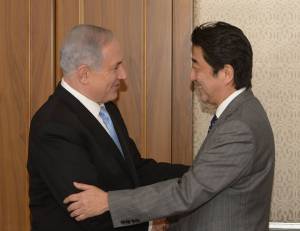
PM Netanyahu and PM Abe. (Photo: Amos Ben-Gershom/GPO)
Japan’s Prime Minister is on an official visit to Israel to advance bilateral cooperation. Netanyahu says anti-Semitism in Europe shows Israel must focus on Asia markets.
Japanese Prime Minister Shinzo Abe arrived in Israel on Sunday, as part of his six-day regional tour. This is the first visit by a Japanese prime minister to Israel since Junichiro Koizumi visited in the summer of 2006.
Abe arrived in Israel with a delegation of over 100 government officials and heads of leading Japanese global companies who arrived in order to evaluate economic opportunities in Israel.
The two prime ministers discussed advancing efforts to expand bilateral cooperation.
Prime Minister Benjamin Netanyahu greeted Abe by stating “[this visit] gives us an historic opportunity to bring together the great capabilities of the people of Japan and the people of Israel. I think there are many economic areas, technological areas and other areas in which we can cooperate, and I look forward to doing that for the benefit of both our peoples.”
Shortly before the Japanese premier landed in Israel, Netanyahu said, “Western Europe is undergoing a wave of Islamization, anti-Semitism and anti-Zionism. These waves are washing over it, and we would like to ensure that the State of Israel will have varied markets around the world.”
At a meeting with Japanese businessmen following Netanyahu’s visit to Japan last year, Abe stated, “we are now seeing steady progress in development of our bilateral relationship in a comprehensive manner. And among all the areas that we are working closely, the economy is the one area which has the greatest potential for advancement of the bilateral relations.” The delegation that has come with him “have extensive experience doing business with Israel and also who all share the passion about the business with Israel, “Abe said.
“Japan and Israel are both countries that don’t have much of the natural resources but what we have is human resources,” Abe said, adding that ties are growing “in every field.”
The Japanese prime minister is regarded as a close ally of Israel. Since taking office in December 2012, the two countries achieved a breakthrough in their relations, and Netanyahu was a guest of the Japanese government for a four-day visit last May.
The two visited an exhibit of Israeli companies which displayed their technological developments, some of which are designed for use in the 2020 Olympics in Tokyo.
PM Netanyahu and PM Abe Attend Innovation Exhibition in Jerusalem:
Other issues to be discussed include encouraging the establishment of R&D centers in Israel and the exchange of industrialists’ delegations.
In the framework of the visit, the Japan External Trade Organization will hold a business conference, to be opened by the two prime ministers, with the participation of approximately 500 Japanese and Israeli businessmen. At the conference, the Economy Ministry will hold an exhibit on Israeli innovation.
Abe is also slated to visit the Yad Vashem Holocaust memorial in Jerusalem.
Israel’s Expanding Economy

(Photo: shutterstock)
The visit comes just a few weeks after Israel’s cabinet approved a plan to strengthen economic ties with Japan at the investment of tens of millions of shekels. Japan is the third largest economy in the world, and trade between the two countries has grown by 10% to $1.75 billion over the course of 2014.
Israel’s government has been working in the past years to diversify its economic activities, reaching out to Far-Eastern, African and South American markets, especially in the wake of Israel’s diplomatic wrangling with Europe.
“In the last two years, I have met with the leaders of China, Japan and India as part of a comprehensive policy of turning to major markets including Latin America and Africa,” Netanyahu said during the meeting.










